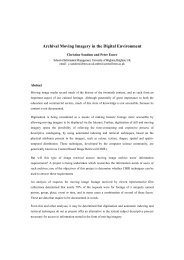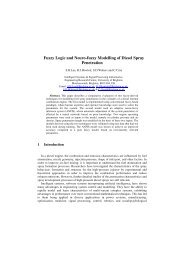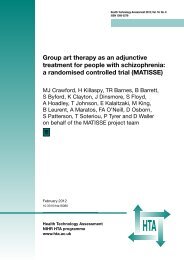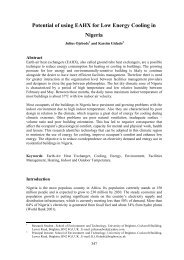TOP TIP - University of Brighton Repository
TOP TIP - University of Brighton Repository
TOP TIP - University of Brighton Repository
Create successful ePaper yourself
Turn your PDF publications into a flip-book with our unique Google optimized e-Paper software.
NEXT STEPS<br />
58<br />
Supporting Young Fathers<br />
Finally, in ‘Thinking About Your Work’ we have drawn attention to the need for<br />
projects and agencies to be critical and reflective when looking at provision for<br />
young fathers. We argue that although such evaluative processes do not always<br />
have to be formalised, it is important that they do happen in order that services<br />
are able to meet young men’s needs more fully.<br />
Next steps<br />
During the fieldwork for this research, it was apparent that a number <strong>of</strong> projects<br />
and agencies sometimes involved young fathers directly in the planning and<br />
delivery <strong>of</strong> services (e.g. T-BAG in Halifax). Moreover, it was also clear that<br />
young fathers are sometimes encouraged to provide peer support to other young<br />
fathers. However, we were left with more <strong>of</strong> an ‘impression’ that both<br />
participation and peer support were probably occurring in some areas rather<br />
than with a concrete picture <strong>of</strong> how it is happening. There are many positive<br />
benefits to be gained from involving young people in such ways, and there are a<br />
number <strong>of</strong> examples <strong>of</strong> this taking place in other arenas (e.g. work with young<br />
mothers, bullying, and the delivery <strong>of</strong> sex and relationship education in schools;<br />
see Cowie and Naylor, 2000; Strange et al., 2002; Wiggins et al., 2005). We<br />
suspect that both participation and peer support in young fathers work is<br />
probably occurring but that their existence and benefits are not widely<br />
publicised. Moreover, it seems likely that the use <strong>of</strong> interchangeable terminology<br />
(e.g. peer support, peer education, peer participation etc.) may also be obscuring<br />
our view <strong>of</strong> what is currently happening. Consequently, we suggest that<br />
participation and peer support work with young fathers would benefit from<br />
being developed more formally. This will <strong>of</strong> course have various implications<br />
(e.g. funding, training, service planning) for both projects and agencies, and the<br />
peer supporters actually delivering the work.<br />
Perhaps unsurprisingly, one particularly persistent theme emerging from our<br />
research was the lack <strong>of</strong> sustained funding for work with young fathers. This is<br />
a controversial topic as some argue that the funding does exist inasmuch as it is<br />
available to support ‘parents’. However, because work with fathers is not firmly<br />
established universally, the reality is that many agencies see working with fathers<br />
as diverting activities from the ‘core business’ <strong>of</strong> supporting mothers and<br />
children. In the National Evaluation <strong>of</strong> Sure Start Plus, Wiggins et al., (2005) note<br />
that a lack <strong>of</strong> funds was the primary reason for many programmes choosing not<br />
to deliver services to young fathers. As we discussed earlier, other complex<br />
factors are at play here as well. Difficulties for pr<strong>of</strong>essionals and services in<br />
defining who the client is or should be, particularly in circumstances where the<br />
father is not involved, only compounds such debates about funding and the<br />
provisions <strong>of</strong> services for young fathers.<br />
In our research, some projects and services have been very creative in order to<br />
support young fathers without access to additional funds, demonstrating that<br />
young fathers work does not need to cost a lot <strong>of</strong> money. However, increasing<br />
coverage <strong>of</strong> work with young fathers and young fathers-to-be clearly requires<br />
sustained funding in the same way more secure resources are currently available<br />
for young mothers. To bring about such change, it is likely that there will need
















